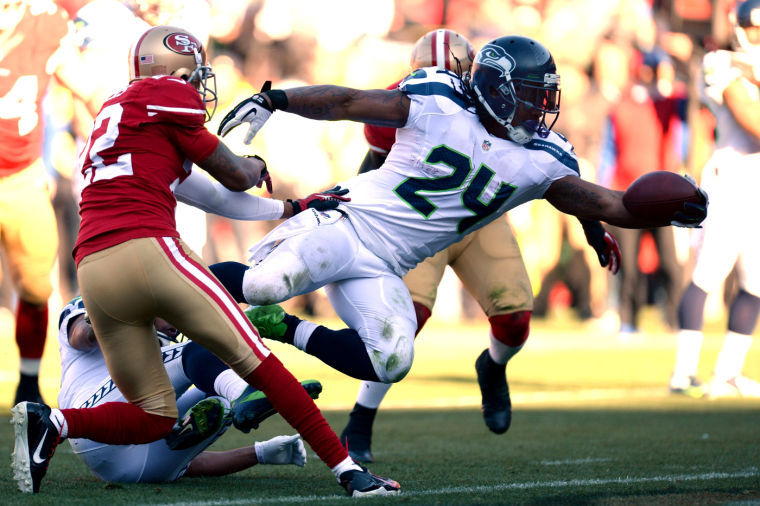Holding out will get Lynch nowhere
Seattle Seahawks’ Marshawn Lynch (24) stretches for a touchdown in the first half against the San Francisco 49ers at Candlestick Park in San Francisco, Dec. 8, 2013.
July 30, 2014
There is yet another disgruntled millionaire in the NFL, and this one belongs to the Seattle Seahawks.
Running back Marshawn Lynch was integral last year in helping the Seahawks to their first Super Bowl title in franchise history. That has given him extra motivation to hold out on his contract and to not show up to training camp for this season. Wednesday marked the sixth day Lynch has been absent, and while that isn’t a substantial amount of time, it is still inexcusable.
While football is a business in the NFL, it is perplexing why millions of dollars aren’t enough. It is also unfortunate that winning at the highest level on the biggest stage is not enough, either. Even Seahawks head coach Pete Carroll has a problem with Lynch’s behavior.
“It’s a contract for a reason. We made a decision, and it was signed, by us and by them,” Carroll told USA Today. “We expect them to honor their contract just as we will. We’re going to honor it, and we expect them to do the same.”
In fact, holding out on the contract is accomplishing nothing. Lynch is actually losing money in this whole process. USA Today reported the Seahawks can fine Lynch $30,000 for each day he is absent, and now that he’s missed six consecutive days, they can force him to give up part of his signing bonus. Unless the Seahawks give in and reward Lynch for his exceptional services and his whining, there is really no point to this nonsense.
Lynch’s current contract already rewarded him handsomely when it was signed in March 2012, and it’s still one of the most expensive in the league for running backs. Since that time, Lynch has totaled 2,847 rushing yards and 23 touchdowns on the ground. While those are convincing numbers, the Seahawks might need to turn to backup running backs Robert Turbin and Christine Michael until Lynch returns.
That’s a scary transition, but quarterback Russell Wilson told USA Today that this is a great opportunity for those players to show the team their skills. The longer Lynch bides his time, the more chances Turbin and Michael will have to grow accustomed to the offense. Hard work can beat talent when talent doesn’t work hard, as the old saying goes.
If this holdout continues any longer, it might go down in history with some of the best. Here’s a brief look at three other players who held out on their contract – for better or for worse.
JaMarcus Russell
In 2007, the Oakland Raiders selected Russell from LSU with the first pick in the draft. Naturally, that is a high honor – one that Russell seemed to think was worth more money than he was originally offered. This holdout lasted for more than six weeks but resulted in a six-year deal worth $68 million at most. Yet Russell played in only four games that year and stayed with Oakland for only three years before the team released him in 2010.
Emmitt Smith
His situation was strikingly similar to Lynch’s and actually gives the Seahawks a small glimmer of hope. Smith helped the Dallas Cowboys to a Super Bowl title at the end of the 1992 season and then entered the 1993 season looking for a massive payout. After all, he led the NFL in rushing yards in 1991 and 1992 and also in rushing touchdowns during the 1992 season. Dallas actually began its 1993 campaign without its star running back and lost the first two games. When Smith returned, he had the biggest contract for a running back in the NFL and went on to lead the league in rushing yards again. More importantly, he helped the Cowboys to their second consecutive Super Bowl victory.
Maurice Jones-Drew
Thirty-eight days passed before Jones-Drew decided to end his holdout against the Jacksonville Jaguars in 2012. He didn’t receive a new contract, despite waiting until a week before the regular season began to join the team. Head coach Mike Mularkey also said he wanted backup Rashad Jennings to start in Week 1 because he had a solid preseason and had been present at training camp. Jones-Drew ended up playing in only six games that season and starting five of those. Worst of all, Jones-Drew earned himself a fine worth almost $800,000 for missing training camp, according to Sports Illustrated.
The fact that players can receive fines for not going to training camp makes the NFL like any other employer. If someone doesn’t show up to work, that person will face consequences. So far, Lynch isn’t showing the Seahawks why they should want to keep him. As physical as the running back position is, there is no guarantee how much longer Lynch will last under an elongated contract. The case of Emmitt Smith was an anomaly.
It remains to be seen how much longer Lynch will hold out. Nevertheless, he is putting the Seahawks franchise in a difficult position and giving them more of a reason to move on without him.









